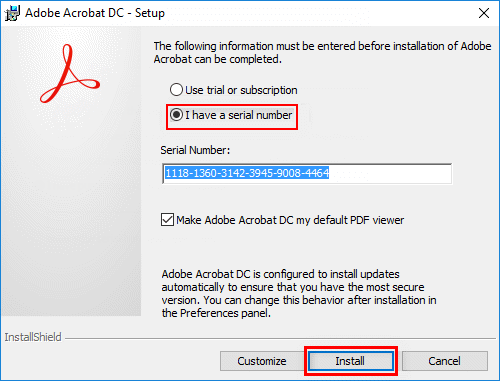

- ADOBE ACROBAT PRO 2017 LICENSE TRANSFER HOW TO
- ADOBE ACROBAT PRO 2017 LICENSE TRANSFER UPGRADE
- ADOBE ACROBAT PRO 2017 LICENSE TRANSFER SOFTWARE
- ADOBE ACROBAT PRO 2017 LICENSE TRANSFER SERIES
- ADOBE ACROBAT PRO 2017 LICENSE TRANSFER DOWNLOAD
– Which machines do I need to deploy Creative Cloud apps? Before you start adapting to the latest Adobe licensing changes, be sure to know the answers to: Step 1: Every successful migration starts with a proper assessment of the current environment. ** Your Value Incentive Plan (VIP) anniversary date is your deadline and actual end of life date** How do you migrate from Device-Based Licensing to Shared Device Licensing? September 1st: Device-Based licenses will be discontinuedĭecember 31st: Suggested migration of all Device-Based Licenses to Shared-Device Licenses ScholarBuys breaks down the Adobe licensing changes for us in this very informational video: When do these licensing changes take effect and what are other important dates?
ADOBE ACROBAT PRO 2017 LICENSE TRANSFER HOW TO
Keep reading for resources on how to make the migration. If you have Device-Based Licenses, start making plans to migrate to Shared-Device Licensing by December 31st.

ADOBE ACROBAT PRO 2017 LICENSE TRANSFER UPGRADE
ADOBE ACROBAT PRO 2017 LICENSE TRANSFER DOWNLOAD
Use of Adobe Sensei which allows users to access shared libraries and moreĪccess to cloud storage which helps users share content and save without having to connect to an external hard driveĭevice management is made simpler: you can group users, control user access to apps, see all associated machines, and other detailsĪbility to assign admin roles to users so they can perform their own functions instead of contacting ITĪpplication packaging is greatly simplified, you can create packages directly from your Admin console and download them from the consoleīut as an administrator, what do these changes mean for you? Here is the TL DR:Ībility to provide users with CC 2019 & the latest versions of apps In a recent helpful post by Adobe, they outline some of the benefits of Shared-Device Licensing as compared to Device-Based Licensing. The move also provides a better user experience for labs, libraries, and classrooms because users now will have access to more tools for collaborating, for a more personalized experience (given users will have to sign in to use Adobe Shared-Device Licenses so Adobe will be able to identify each user and customize the experience accordingly), and for accessing creative cloud on the go. With the move over to 64-bit, Adobe claims they are providing a much more robust and secure licensing platform. Adobe says they are implementing these licensing changes because their legacy licensing technology is based on a 32-bit application which users and organizations have deprecated in their environments. While you as an admin may not have a choice as to whether or not to move to Shared-Device Licensing, you may be wondering why the extra effort and change. With this change, Adobe has made it so that if you are looking to move to CC 2019 from CC 2018 and you have Device-Based Licenses in your environment, you will have to switch those over to Shared-Device Licenses in order to use CC 2019. This new Shared-Device License is conceptually similar to its Device-Based predecessor but what it does is it brings more personalization to the user experience and more simplification for you which is all around a great thing, although it will take some work on your end to make the switch happen. In October 2018, Adobe announced they were going to eliminate Device-Based Licensing to focus on Shared-Device Licensing starting 2019 (if you’re interested in learning about the different types of licenses, skip to this section). If this sounds like your environment, then these Adobe licensing changes may affect you:

Spoiler alert: These changes are most likely relevant to you if you have Device-Based Licensing in your environment and/or if you are using one of the discontinued apps.
ADOBE ACROBAT PRO 2017 LICENSE TRANSFER SOFTWARE
But what are the Adobe licensing changes, which dates should you be looking out for and what do you need to do about them? If you are an IT administrator or a license manager for Adobe software licensing, this post is for you… What are the Adobe licensing changes?
ADOBE ACROBAT PRO 2017 LICENSE TRANSFER SERIES
In 2018, Adobe announced a series of changes to their licensing to which many of us have already started adapting.


 0 kommentar(er)
0 kommentar(er)
